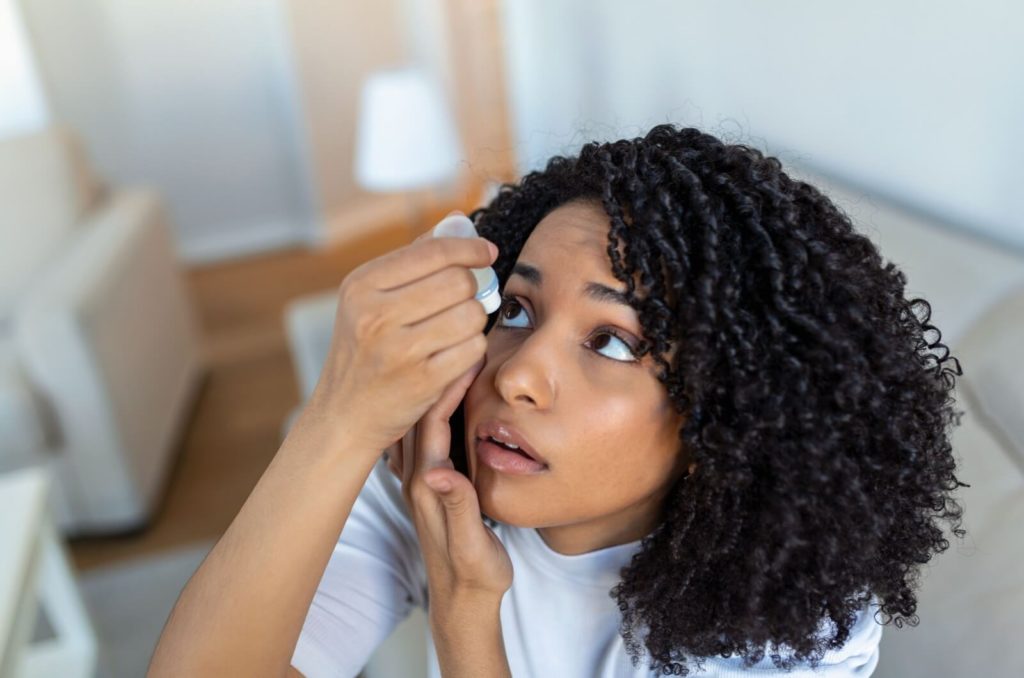Dry, itchy eyes are common symptoms of dry eye when the eyes lack enough moisture. Dry eye can also cause blurred vision.
However, while blurry vision is a symptom of dry eye, dry eye and blurry vision can also result from other factors or underlying conditions. Your eye doctor can perform an eye exam to determine the root cause and provide personalized treatment options.
What Is Dry Eye?
Dry eye is an ocular surface disease that occurs when your eyes don’t produce enough tears or when the tears are of poor quality. Tears are essential for maintaining and protecting healthy eyes, and for preventing tears from evaporating. However, with insufficient tears or an unstable tear film, your eyes can become dry and irritated, leading to various symptoms.
Symptoms & Causes of Dry Eye
Dry eye symptoms can vary based on the severity but often include the following:
- Redness
- Stinging or burning sensation
- A feeling of grittiness or scratchiness
- Irritation
- Blurry vision
- Excessive watering
Several causes of dry eye can include:
- Environmental factors like wind or smoke
- Prolonged screen use, which reduces blinking
- Age
- Hormonal changes
- Certain medications
- Underlying health conditions
Dry Eye & Blurred Vision
You might be wondering, how does dry eye lead to blurred vision? The answer lies in the role tears play in maintaining clear vision.
The Role of Tears in Vision
Tears form a thin film over the surface of your eye, creating a smooth optical surface. This tear film helps to focus light properly on the retina (the light-sensitive tissue at the back of the eye), allowing you to see clearly. When dry eye disrupts the tear film, this can cause irregularities on the eye’s surface, leading to blurred vision.
Fluctuating Vision Quality
If you have dry eye, you might notice that your vision quality fluctuates throughout the day. For instance, your vision may be clearer in the morning, but may become blurrier as the day progresses. This fluctuation is often due to changes in your tear film stability and the evaporation rate of your tears. Tears can evaporate more quickly if your tear film lacks its oil layer.
Temporary vs. Persistent Blurred Vision
It’s important to distinguish between temporary and persistent blurred vision. Temporary blurring can occur due to environmental factors or prolonged activities that strain your eyes, such as reading or using a computer. However, if you experience persistent blurred vision, it’s essential to see your eye doctor to rule out other underlying conditions.
How to Identify Dry Eye as the Cause of Blurred Vision
Identifying whether your blurred vision is due to dry eye involves paying close attention to your symptoms and circumstances.
Monitor Your Symptoms
Keep track of when you experience blurred vision and any other accompanying symptoms. Do your eyes feel dry, irritated, or watery? Noting these details can help your eye doctor determine if dry eye might be the culprit.
Environmental Triggers
Consider the environments where your symptoms worsen. Are they more pronounced in air-conditioned rooms, windy places, or after long hours of screen time? Identifying these triggers can provide clues about the cause of your blurred vision.
Simple Tests at Home
A simple test at home can check if dry eye affects your vision. Try blinking rapidly for a few seconds to see if this temporarily clears up your vision. If it does, it might indicate that your tear film is not stable enough, and may be responsible for for your blurred vision.
Dry Eye Treatment & Management

With a comprehensive eye exam, your eye doctor can assess the severity of your dry eye and its impact on your vision. They might use specialized tests to measure your tear production and evaluate the quality of your tear film. Once they diagnose blurry vision caused by dry eye, they will recommend several ways to treat and manage your symptoms.
At-Home Remedies
Start with simple at-home remedies. Applying warm compresses to your eyes can help stimulate tear production. Blink more frequently, especially when using screens, and take regular breaks to prevent your eyes from drying out. Using a humidifier in your home can also add moisture to the air, reducing dry eye symptoms.
Over-the-Counter Solutions
Artificial tears or lubricating eye drops can provide immediate relief by supplementing natural tears. Look for preservative-free options if you need to use them frequently.
Eye Nutrition
A healthy, varied diet with nutritional supplements like omega-3 fatty acids can bring relief. Staying well-hydrated by drinking plenty of water is essential as well.
Seek Professional Help
While at-home remedies and over-the-counter solutions can be effective for mild cases, for severe and chronic cases, you may need personalized treatments. Such treatments might include prescription eye drops to reduce inflammation or increase tear production, or in-office procedures such as meibomian gland expression.
Dry Eye & Blurry Vision Relief
Dry eye syndrome can significantly affect your quality of life, especially when it leads to blurred vision. Understanding the connection between dry eye and vision quality is the first step toward finding relief.
You can manage your dry eye effectively and improve your vision by identifying your symptoms, trying at-home remedies, and seeking professional help.
If you’re experiencing symptoms and unsure where to start, book an appointment with Headwaters Optometry for a personalized treatment plan tailored to your needs.




